Yves here. Even though our alert readers have taken note of Lithuania’s blockade of Kaliningrad, which is part of Russia, the Western press has largely ignored it, despite the move having generated a great deal of anger in Russia. Yes, it’s not a full blockade; Lithuania says it’s only barring shipments (first by rail but now also by truck) of goods included in the EU’s fifth sanctions package. Those amount to about half the transit amounts and are allegedly skewed towards building materials. However, Russian Foreign Ministry spokeswoman Maria Zakharova indicated that food shipments are being turned back too. If so, I haven’t seen any mention in the Western press.
In addition, one has to wonder if all transiting items will be inspected, meaning an important aim is also to impede the movement of everything going between Russia and Russia, um Russia and Kaliningrad.
Note Russian and Kaliningrad officials have said they can move the sanctioned goods by sea and have told citizens in Kaliningrad not to panic and stockpile. But the fact that Russia can organize workarounds doesn’t change the fact that this move is a violation of the treaty recognizing Lithuania’s independence.
The fellows at the Duran discussed Lithuania and Kaliningrad yesterday and speculated that the US would not come and help. As Helmer explains, the big powers are already making clear they are not dirtying their hands. This then begs the question of why Lithuania stuck its neck out this far. Did it misread signals from the EU or get them from a hawk who was not fully authorized to send them?
By John Helmer who has been the longest continuously serving foreign correspondent in Russia, and the only western journalist to have directed his own bureau independent of single national or commercial ties. Helmer has also been a professor of political science, and advisor to government heads in Greece, the United States, and Asia. Originally published at http://johnhelmer.net/exile/#more-48049” rel=”nofollow”>Dances with Bears
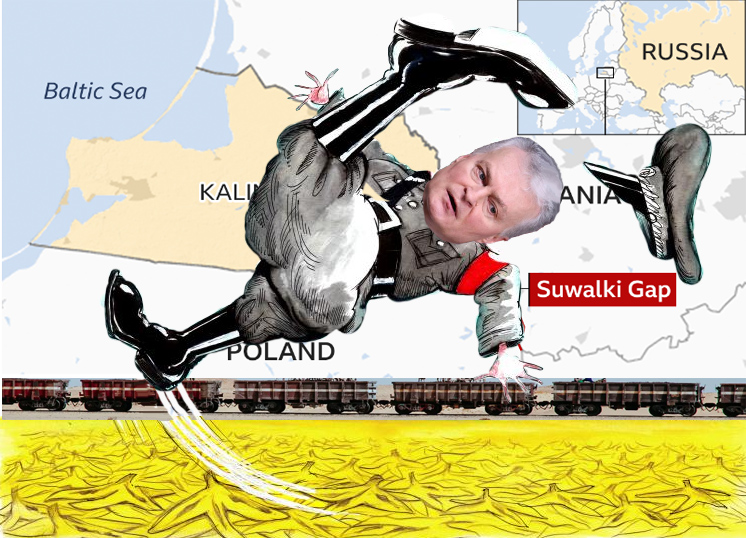
The action the Lithuanian government implemented over the weekend to stop Russian trains carrying sanctioned cargos into Kaliningrad is regarded in Moscow as a long anticipated move, prompted among Lithuanian officials by the British government. The initial Lithuanian embargo action has been followed by a second one this week extending the blockade to trucks and road transport. Neither action has been publicly announced by the Lithuanian government.
The first news came from Anton Alikhanov, the governor of the Russian oblast of Kaliningrad, following a notice sent to him by Lithuanian officials. That notice has not been published.
Lithuanian president Gitanas Nauseda (lead image) has said nothing.
Lithuanian Prime Minister Ingrida Simonyte announced through the British Broadcasting Corporation that the blockade was not a blockade because only some cargoes were halted, and because “Lithuania is complying with the sanctions imposed by the European Union on Russia for its aggression and war against Ukraine ” . She also told the British state radio “it was important not to overreact”.
She tweeted: “Any talk of a blockade of Kaliningrad is a lie. Lithuania is complying with the sanctions imposed by the EU on Russia for its aggression and war against Ukraine. The sanctions were agreed by all the EU member states on March 15…. Passenger transit is also taking place, under a special agreement by the EU, RU, & LT. Steel and ferrous metal products account for only around 1% of the total rail freight to Kaliningrad via LT.”
In the three days which have followed the Lithuanian action, the US and British Governments, the European Union (EU), and the North Atlantic Treaty Organization (NATO) have not supported the Lithuanian blockade.
The Russian Security Council met on Wednesday morning, but issued no statement on Lithuania. The Secretary of the Council, Nikolai Patrushev, who was in Kaliningrad on Tuesday, had announced there that the “consequences will have a serious negative impact on the population of Lithuania.”
Yesterday, at the same time as President Vladimir Putin was chairing the Security Council meeting, the Russian Foreign Ministry announced it is delaying “concrete measures” in reaction: “The measures will not be diplomatic, but practical, they are now being worked out in an interdepartmental format, We are not talking about this not because we are hiding something, but because the process of their coordination and elaboration is underway. I would like to emphasize once again (the third time for today’s briefing): we have told the European Union and Lithuania about the need to change the steps they have taken. Perhaps something from that side will be changed, and, accordingly, our reaction will be different.”
Here is a compilation of the official documents.
The US State Department, June 21:
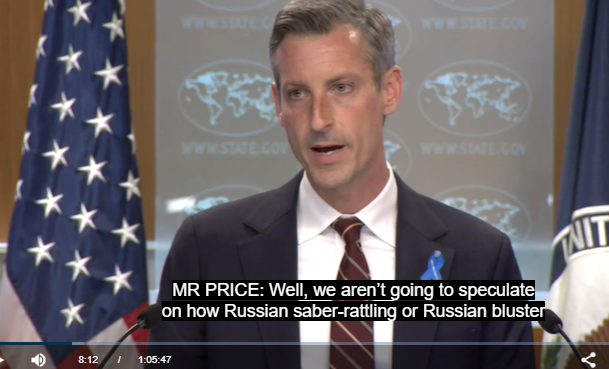
Source: https://www.state.gov/
“QUESTION: (Inaudible) about the tensions around Kaliningrad. What do you make of the statements from Russia threatening of serious consequences and the train?
MR PRICE: Well, we aren’t going to speculate on how Russian saber-rattling or Russian bluster – don’t even want to give it additional airtime. We have been very clear over the course of Russia’s war against Ukraine, and in fact well before Russia began its unprovoked invasion of Ukraine, that our commitment to NATO and specifically our commitment to NATO’s Article 5, the premise that an attack on one would constitute at attack on all, that commitment on the part of the United States is ironclad. Not only have we made that clear rhetorically, but together with NATO and with our own announcements of troop posture adjustments, we have reinforced our commitment to the NATO Alliance. We have reinforced NATO’s eastern flank, especially those countries who have been at the forefront of Russian threats over the course, in many cases, of many years.
We, of course, appreciate the unprecedented economic measures that many countries around the world, dozens of countries across continents that our allies and our partners, including in this case Lithuania, have joined us in taking against Russia for its unprovoked war in Ukraine. Of course, would refer you to Lithuania regarding its enforcement of EU sanctions.
QUESTION: So you fully support Lithuanian enforcement of the sanctions and against any threat from Russia?
MR PRICE: Lithuania is a member of the NATO Alliance. We stand by the commitments that we have made to the NATO Alliance. That includes, of course, a commitment to Article 5 that is the bedrock of the NATO Alliance. This is a campaign that includes dozens of countries around the world, including blocs of countries, in this case the EU but also individual countries using their national authorities. Lithuania has been a stalwart partner in this. We stand by NATO. We stand by our NATO Allies, and we stand by Lithuania.”
The UK Government, June 20-21:
The British Government issued no official statement on Lithuania and Kaliningrad except through editorial comments published by the BBC. The Foreign Secretary, Elizabeth Truss, has issued these statements:
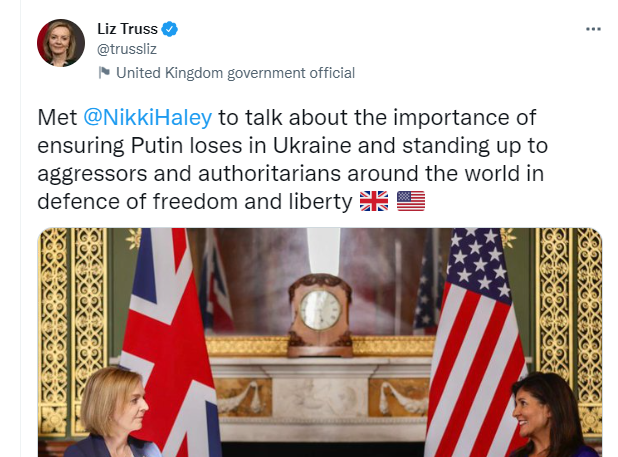
Source: https://twitter.com/trussliz/
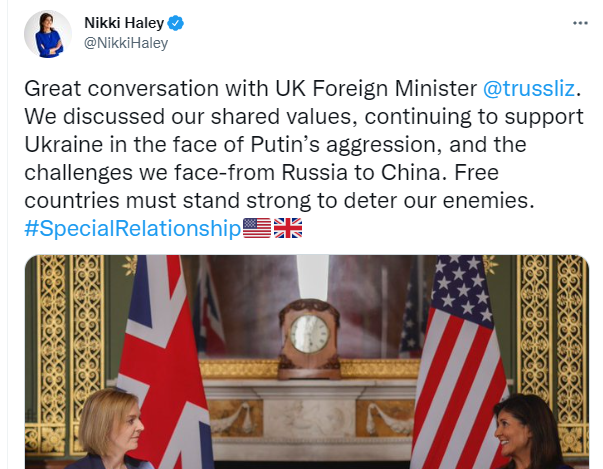
Source: https://twitter.com/NikkiHaley/
The European Union (EU) has been silent.
The EU President, Ursula von der Leyen, has issued these statements:
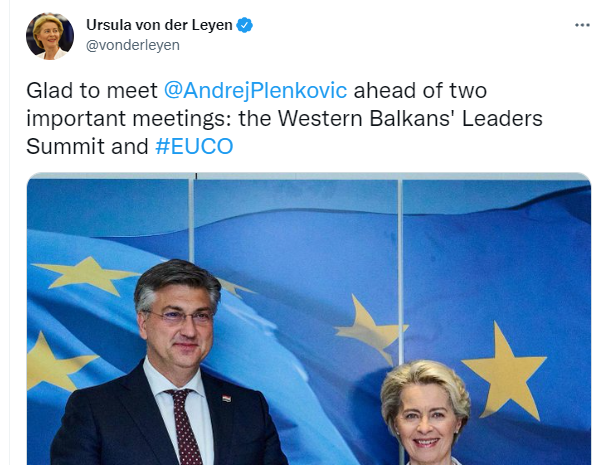
June 22 -- https://twitter.com/vonderleyen/
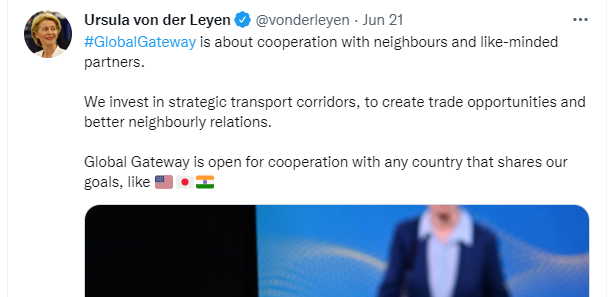
June 21 -- https://twitter.com/vonderleyen
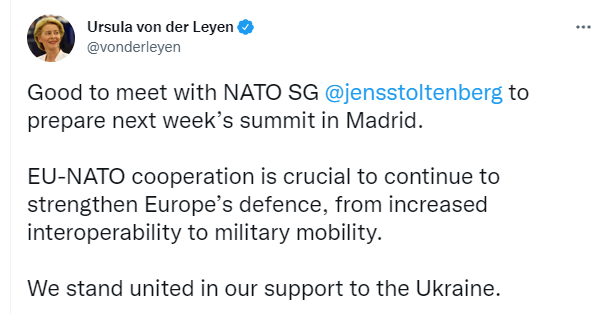
June 20 -- https://twitter.com/vonderleyen/
NATO has been silent.
A NATO summit meeting is scheduled in Madrid next week, June 28-30. There is no reference to Lithuania on the agenda. Secretary-General Jens Stoltenberg has issued this statement:
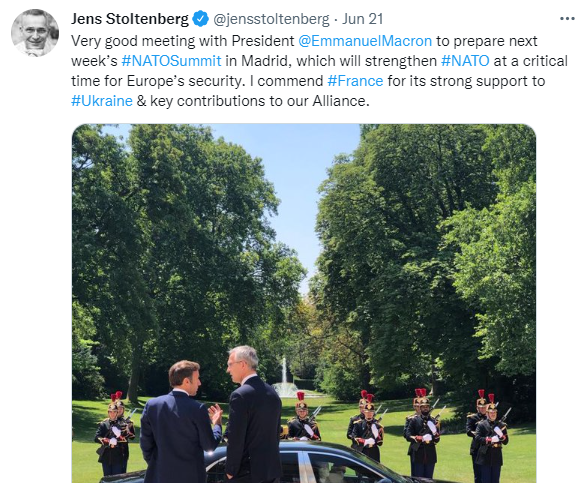
June 21 -- https://twitter.com/jensstoltenberg
Russian statements:
Kremlin spokesman, Dmitry Peskov, June 20: “This decision is truly unprecedented. It is a violation of absolutely everything. We understand that this is due to the relevant decision of the European Union – to extend sanctions to transit. We also consider it illegal. The situation is really very serious, and it requires a very deep analysis before preparing any measures or any decisions. This thorough analysis will be carried out over the next few days. It’s an element of the blockade, of course. I repeat once again: we need a serious, in-depth analysis in order to hammer out response decisions.”
Security Council Secretary Nikolai Patrushev, in Kaliningrad on June 21. “Russia will certainly respond to such hostile actions. Appropriate measures are being worked out in an interdepartmental format and will be taken in the near future. Their consequences will have a serious negative impact on the population of Lithuania.”
Kaliningrad Governor Anton Alikhanov – June 21.
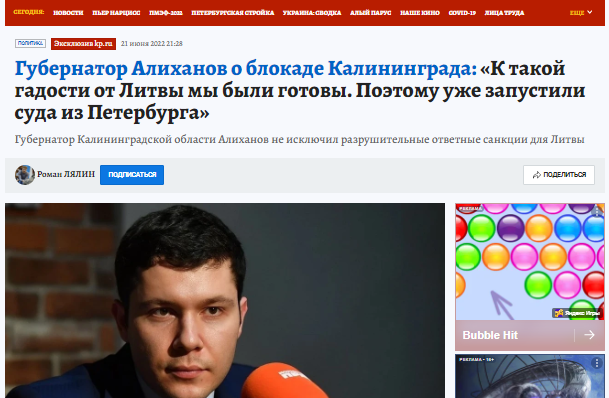
Source: https://www.spb.kp.ru/
“The Kaliningrad region was in a blockade due to the sanctions of Lithuania, which banned the transit of some goods from Kaliningrad to Russia and back. This decision affected building materials, metals, cement, oil, petroleum products, elite alcohol, caviar and other goods. But Kaliningrad does not despair. Now these and other cargoes will be redirected by the authorities of the region not via Lithuanian railways, but through the ports of St. Petersburg. KP-Petersburg learned the details personally from the Governor Anton Alikhanov.
– Today, the Secretary of the Russian Security Council, Nikolai Patrushev, arrived in Kaliningrad, at a meeting with whom you just discussed the sanctions imposed?
– Yes, during a personal meeting with Nikolai Platonovich, we discussed issues of energy, transport security of the region, as well as information security, including ensuring our stable connection with the main territory of the Russian Federation. Then the Security Council itself dealt with border policy, and we have discussed projects within the framework of cross-border cooperation programs that we had with the European Union until recently.
– Did you discuss that the situation is threatening? Or vice versa – is everything stable?
– I would not paint any picture of the disaster. In fact, within the framework of the same Security Council, we made decisions to strengthen the transport security of our region. And the decisions of those past years have given us the opportunity to feel confident enough now. We have additional transportation capacities that are already involved: these are four vessels that are already on the line. The fifth new vessel is coming into operation on Friday. And even taking into account the aggressive actions of our neighbours, we have full confidence that we will be able to redistribute traffic flows so that the sanctioned cargo that they do not allow through their territory will be directed to the sea lanes connecting our region with St. Petersburg. This, of course, is extremely unpleasant, inconvenient in some sense, but we do not see anything catastrophic in this. We were ready for such nastiness.
– Nikolai Patrushev says that we will respond harshly. What are the possible answers?
– Look. I think that it is not in my competence to voice the answers, but I assure you that there are a great many such options. And, unfortunately for the Baltic states, their transport complex is extremely dependent on cooperation with the Russian Federation, both in transit and cargo base issues. I think the answers can be extremely devastating in terms of the consequences. And I really hope that, taking into account this situation, taking into account the consequences that may arise for this industry, the decision of European countries will be changed; and that Kaliningrad transit will not be restricted as the [Lithuanians] have restricted it at the moment.
– Additional vessels from St. Petersburg: how many will there be, and when will they go?
– The first additional vessel Kholmogory will be released on Friday. This is a vessel of the Northern Shipping Company. This company is ready to put several more vessels on the route, depending on our needs. We are currently working with them, studying how much we need, because we will reorient some of the goods, some of the cargo that are not subject to sanctions, from the sea ferry crossing to the usual railway tracks. And in this way we will free up capacity for the transportation of sanctioned cargo on existing ferries. Therefore, it is quite difficult to say exactly the number of new vessels.
Nevertheless, the new vessel is already leaving the port of Bronka – from St. Petersburg to us in Kaliningrad. And over the next few weeks we will be bringing on line the new vessels. The maximum that we thought we may require is seven vessels. But I think that in reality the figure will be less, due to the fact that some of the sanctioned goods are already being carried by ferries, and some of the non-sanctioned ones will free up space. We need a maximum of seven vessels, but perhaps, in fact, we will need three or four.
– Will they all go from St. Petersburg and Leningrad region?
– Yes. These vessels will carry sanctioned cargo – coal, fuel, metal structures, metals, cement. These are the main gazetted cargoes, and the sanctions also cover the finished products which are exported from our region — these are automotive components, cars, trucks, dump trucks that we produce here, as well as the production of chemical products.
– Explain to ordinary people – is it more expensive to carry ships?
– You know, there are different ways for different cargoes. But our task, and we are currently working on this issue, is to ensure that the cost of sea transportation is similar to the tariffs that apply on the railway.
– That is, we used to pay to the European Union, and now we will pay to our ports?
– The wording is controversial for me personally, I will not confirm or deny it. But I can say that when the money stays in Russia and does not go to the Lithuanians, as it seems, it is good in any case.
– So we can also win?
– Yes, of course. As a result I think we won’t lose.
– Will the sanctions hit Lithuania harder or us?
– Listen, these sanctions have already hit Lithuania. The payment for rail transit for Lithuania, in general, the economy of Lithuanian railways is one of the cornerstones of their budget, so for them it is also such a boomerang. Not to mention the potential retaliatory steps of the Russian Federation in relation to the Lithuanian transport sector. Therefore, I am sure that they are not happy about what is happening.
– How much will they lose approximately?
– I’m not going to name it now, I’m afraid to be inaccurate. But yesterday I was talking about alcohol labeling — if, for example, we say that we refuse to take alcohol, which they label there. Supposing we allow it to be labeled only on our territory as part of an experiment that is being conducted on behalf of the president, then our estimates were such that this is about €300 million of turnover, which we can take from them and transfer to the Russian Federation. I believe that this money will be an additional source for equalizing the ferry costs.
– Have the Lithuanians themselves contacted you?
– No, God forbid, they have curtailed all types of contacts with us since 2012, unfortunately. That’s why they haven’t contacted me for a long time.
– Were you forbidden to carry only alcohol, truffles and caviar from the products?
– It is necessary to look at alcohol, they banned only luxury. It doesn’t mean all the alcohol. Relatively speaking, Italian and French wines continue to be supplied.
– Will it affect tourists?
– No. The sun is shining, tourists are walking around the city, we are waiting for everyone, you are welcome. Everything is fine with us, we live in a normal mode. This situation will not affect tourists at all.
– What is the percentage that these sanctions will be lifted?
– It’s like in the famous joke: “What percentage of the probability that you will meet a dinosaur on the street? 50-50, either you will meet or not.” It’s about the same with the Lithuanian authorities. Like with a dinosaur.”
Military options, June 20 – Moskovsky Komsomolets
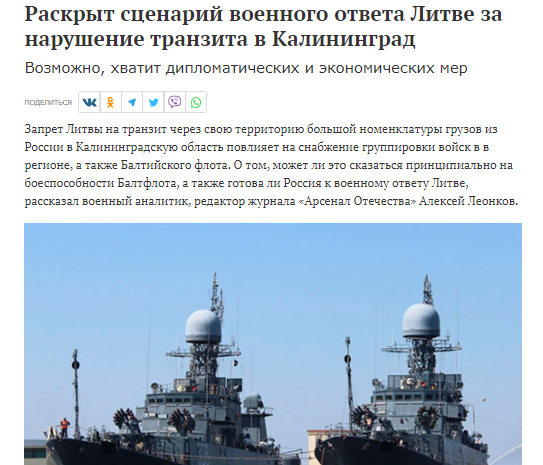
Source: https://www.mk.ru/
“The scenario of a military response to Lithuania for violation of transit to Kaliningrad is revealed — perhaps diplomatic and economic measures will be enough
Lithuania’s ban on transit through its territory of a large range of goods from Russia to the Kaliningrad region will affect supply of the troops deployed in the region, as well as the Baltic Fleet. Alexey Leonkov, a military analyst and editor of the Arsenal of the Fatherland magazine, talked about whether this could fundamentally affect the combat capability of the Baltic Fleet, as well as whether Russia is ready for a military response to Lithuania.
In his opinion, Lithuania’s ban on land transit, in the near future, will not significantly affect the supply of goods to the Baltic Fleet.
‘After all, they do not block the sea route along the Baltic,’ says Leonkov. ‘And they are unlikely to take this step at all, since it would actually mean declaring war on Russia. The ban on supplies will have a greater impact on the development of the Kaliningrad region. As for our possible military response, a number of factors should be taken into account. Our Foreign Ministry has already decisively told the representatives of Lithuania and the EU that they violate the agreements that we had when Russia recognized Lithuania as an independent state. Then we were promised unhindered transit to the Kaliningrad region.’
According to the expert, a military response will be the last measure that Russia will be forced to use if diplomatic and economic levers do not work in relation to Lithuania.
‘And we still have a lot of such economic levers in relation to Lithuania,’ Leonkov clarifies. ‘Moreover, they should be applied not gradually, but immediately, so that this country would be shocked by our actions. If this does not help, then, of course, military measures will have to be applied, which will have to ensure unhindered passage to the Russian enclave.’
‘Many believe that in this case, Article 5 of the NATO collective security treaty will have to operate. This is interpreted as a mandatory entry into the war of the entire Alliance, if an attack is made on one or more NATO countries. In fact, the wording of this article is not as unambiguous as it seems to many. It does not speak of the automatic entry into the war of the entire NATO alliance because of a single country situation. Everything is stipulated by a number of conditions. And another big question is whether NATO countries are ready to get involved in a war with Russia for the interests of Lithuania, realizing that such a war is likely to lead to a conflict with the use of nuclear weapons.’
NATO TREATY ARTICLE FIVE
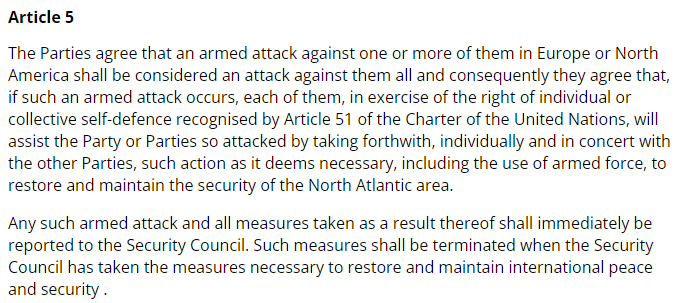
Source: https://www.nato.int/
Alexei Leonkov believes that in the current situation, Europe is not inclined to aggravate the situation. Moreover, Lithuania claims that it has coordinated its actions with the EU. But so far, Vilnius’ statements have not been officially confirmed and the Lithuanian steps have not been supported. ‘I think,’ says Leonkov, ‘that Lithuania, which staged this provocation on the initiative of the UK, will still back down after we use diplomatic and economic levers. But if they do not lead to a result, then here, as they say, if you do not want to talk to Lavrov, then you will deal with [Defense Minister Sergei] Shoigu. Ukraine has already understood this.’”.
Other Russian options, June 21 – RIA Novosti
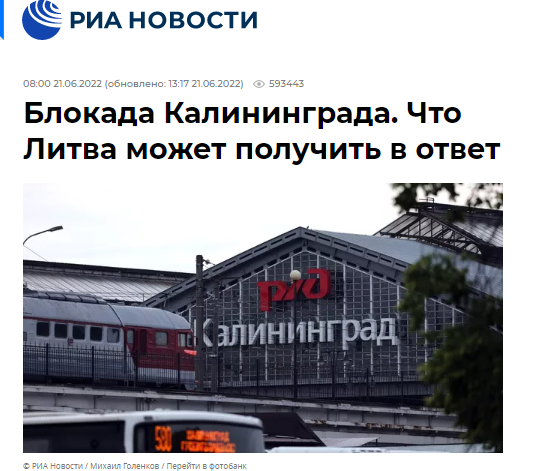
Source: https://ria.ru/
“MOSCOW, June 21 — RIA Novosti, Mikhail Katkov. Vilnius has actually blocked the land transport corridor connecting “mainland’ Russia with the Kaliningrad region. According to preliminary forecasts, supplies to the enclave may be reduced by four times, and the list of goods will be reduced by half. RIA Novosti has been looking into the situation.
Vilnius has banned the transit of sanctioned goods since June 18, stating that it has coordinated actions with the European Union. According to theGgovernor of the Kaliningrad region Anton Alikhanov, this is about 40 to 50 percent of transit cargoes, an embargo on which can lead to economic suffocation of the region.
According to Dmitry Chemakin, former vice-president of the Kaliningrad Chamber of Commerce and Industry, the volume of supplies may fall four times. However, local authorities and businesses have been preparing for difficulties in advance, so they expect to avoid extremely negative scenarios. In the meantime, they plan to increase the number of ferries that will run between Ust-Luga and the Baltic. Four vessels are currently operating on the line, and another one will appear in September. In the event of a complete transport blockade of the Kaliningrad Region, about 20 vessels of different classes will be required, but even five will be enough to load the railway and ferry complex in Baltiysk by 100 percent. Spending on infrastructure development, according to Alikhanov’s preliminary estimate, will amount to about ten billion rubles.
However, the speed of construction depends not only on the source and amount of financing, but also on logistics — building materials are also under sanctions. In addition, as Dmitry Lyskov, the press secretary of the governor of the Kaliningrad Region, told RIA Novosti, coal will stop being imported through Lithuania in August, and other types of fuel will stop in December.
‘Since the beginning of the crisis, many enterprises have started switching to ferry services, realizing that sooner or later Lithuania would close its borders. But the ships sailing to us are completely clogged, while in Ust-Luga — empty. If the sea remains the only opportunity for transit, subsidies from the federal centre will be needed. Otherwise, prices for imported goods will be very high for consumers,’ says Svetlana Nizhegorodova, Business Ombudsman for the Kaliningrad Region. At the same time, the human rights activist is confident that with the right number of ferries and the financial support of the carrier, the impact of sanctions on the region will be minimized.
In 2021, 50 percent of cargo reached the region by rail, 40 percent by sea, and ten percent by cars and airplanes. The fifth package of European sanctions imposed against Russia in April 2022 affected cargo transportation, but Kaliningrad was the exception. It was believed that this was due to the agreements signed in the early 2000s, under which Lithuania pledged not to interfere with supplies to the Russian exclave in order to get into the European Union. Deputy Speaker of the upper house of Parliament Konstantin Kosachev said that Lithuania violated international legal pacts when it banned the transit of goods. In addition to the agreements between Russia and the EU, he mentioned the WTO agreement on tariffs and trade and international transport conventions. The politician did not rule out that in the future the West may also violate the UN Convention on the Law of the Sea, thanks to which ships come to the Kaliningrad region through neutral waters. There is a possibility that Russia’s opponents will do the same with the airspace, the senator believes.
Federation Council member Andrey Klimov called the blockade a direct aggression and suggested resorting to self-defense. His colleague Andrey Klishas regarded the Lithuanian restrictions as an encroachment on Russia’s sovereignty and considered a ‘very tough’ response possible. ‘Let them look at Ukraine and think about what other methods can be adopted on our part,’ Senator Sergei Tsekov said. The Russian Foreign Ministry has demanded that the Lithuanian authorities immediately lift all restrictions imposed, which Moscow considers ‘openly hostile.’ Otherwise, Russia reserves the right to retaliate. At the same time, the ministry did not explain what kind of reaction there might be.
There is a popular version in the Western media that in the event of a blockade of the Kaliningrad region, Russia will break through the so-called Suwalki corridor from the territory of Belarus. Its length is about 65 kilometers direct or about 100 kilometers along the Polish-Lithuanian border. The route was named after the Polish city of Suwalki. However, experts consider the military scenario the least likely of all possible. Despite public statements, politicians and diplomats understand that an invasion of one of the NATO countries can lead to irreparable consequences, up to the outbreak of the Third World War.
‘Lithuania has blocked Kaliningrad on land, and we, with the support of Belarus, can respond in kind. Moreover, the entire Baltic States will suffer, local ports will be completely useless,’ explains Alexei Leonkov, editor of the Arsenal of the Fatherland magazine. Economist Leonid Khazanov agrees with him, but he suggests adding energy to the transport blockade. ‘There is a liquefied gas processing terminal in Klaipeda. Its capacity is four billion cubic meters. If Russia stops selling blue fuel to Lithuanians, not only this enterprise, but also the entire local industry will stop without a single shot,’ the expert points out.
Nevertheless, experts believe that attempts to reach an agreement with the Lithuanians will lead to nothing. Any chance of success is possible only in negotiations with the European Union, where there are different views about relations with Moscow. In early April, Vilnius declared full gas independence from Moscow. However, experts do not rule out that we are talking about deliveries via pipeline, while liquefied natural gas, including Russian, was both transported and transported by sea. In addition, there are proposals to disconnect Lithuania from the single electric grid of BRELL, which also includes Russia, Belarus, Latvia and Estonia. The Baltic states were going to leave the energy system by 2025, but in this case [Russian disconnection of] Vilnius may be accelerating.”
THE BALTIC ELECTRICITY GRID, BRELL
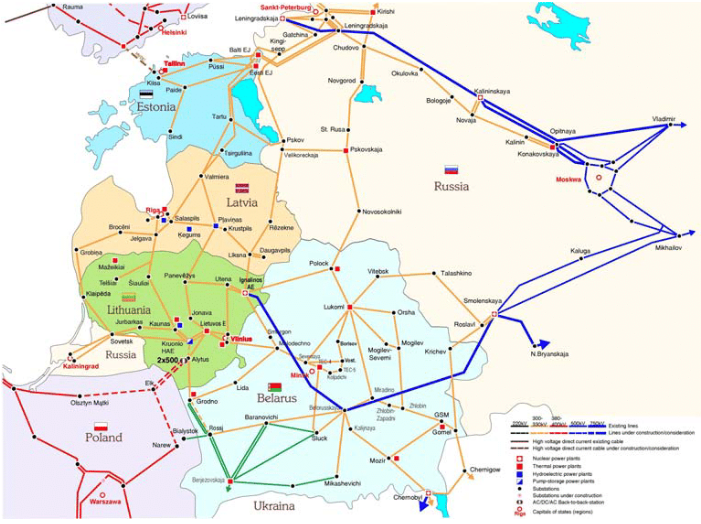
To enlarge, click on source.
The Kremlin
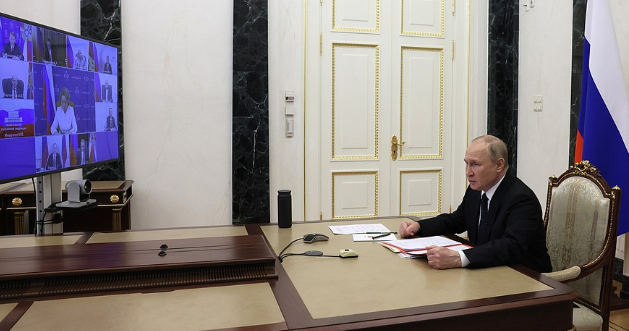
Source: http://en.kremlin.ru/
Russian Foreign Ministry
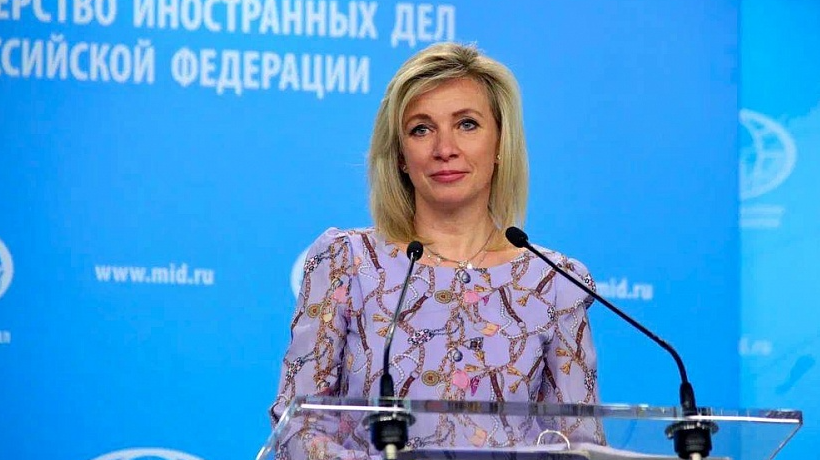
Source: https://www.mid.ru/
At the Foreign Ministry briefing spokesman Maria Zakharova had this to say:
“Question: Do I understand correctly that there is no need to talk about concrete tough measures against Lithuania for blocking transit to the Kaliningrad region, that is, there are no concrete measures by and large.
Answer: As I said, they are being developed. This is an interdepartmental issue. Given that the measures will not be diplomatic, but practical, they are now being worked out in an interdepartmental format, we are not talking about this not because we are hiding something, but because the process of their coordination and elaboration is underway. I would like to emphasize once again (the third time for today’s briefing): we have told the European Union and Lithuania about the need to change the steps they have taken. Perhaps something from that side will be changed, and, accordingly, our reaction will be different.
I would like to draw your attention (it is unlikely that you will write about this, but I would like you to quote me) that it is illogical for the European Union, its individual members, on the one hand, to say that a threat to global food security is being created, and on the other hand, to block the delivery routes of goods directly to themselves or to your continent. Either we proceed from the fact that food security for the European Union, as they say, is of fundamental importance and they care about the fate of the world, but if so, then it is necessary, at least, to free up entire sectors of the economy, logistics, transport so that they have the opportunity to work for the benefit of that very food security. How many times do you not say the word ‘food’ until it reaches the consumer before he will fail to become full.
It’s the same story here. Food must be transferred, delivered. It must be paid for. If all this is blocked, and now also with such a specific point solution, then what are we talking about? This applies not only to food security, but fundamentally to the humanitarian sphere.
Question: When you talk about the practical plane, is it possible to understand that we are talking about the economic plane?
Answer: When I talk about the practical plane, I mean that we are not talking about measures of a diplomatic nature, but about practical steps. Let’s not get ahead of ourselves. We need to wait for the appropriate decision to be made.”


“Did it misread signals from the EU or get them from a hawk who was not fully authorized to send them?”
I sense the grubby paw prints of the UK all over this one.
Indeed. Up to and including the Lithuanian announcement that the EU told them to do it. It’s hard to believe that any nation would still believe promises of support from the UK. If nothing else it would seem like the military leaders would whisper in the politicians’ war, “They don’t actually have much of a military. They won’t spend what little blood they have on us.”
Increasingly, it seems to me that the UK is the prime driver behind much of what is happening. Most of Europe seems to be running around like the proverbial headless chicken, while I suspect that the US has less real influence than it thinks due to distance (and as always, the US is as much the manipulated as the manipulator). For the UK its perfect – they want to mess things up for Russia, and they don’t care if it backfires on eastern or central European countries. So they can stir things up without fear of blowback.
It sure seems like the UK is throwing their weight around here, given that BoJo told Zelensky a while back that he might as well not bother trying to negotiate with Russia.
With the Brexit mess and Johnson’s personal troubles, it looks like BoJo is putting on a show to deflect attention form himself and make it seem like the UK is still relevant in world affairs. You’d like to think our ostensible leaders were above that sort of thing given the actual lives that are at stake here, but it’s becoming ever clearer that they are not.
I almost wonder if the UK is trying to use the Ukraine situation to destabalise the EU to cover themselves after Brexit?
What I cant figure out is how anyone in the EU is falling for it?
Fred: What I cant figure out is how anyone in the EU is falling for it?
What exactly would — could — ‘anyone in the EU’ do to stop it? How would that work?
[1] Putin and Russia’s military really is in Ukraine, violently rubbishing the assumptions of the EU’s Atlanticist “rules-based international order.” These are people who really thought they’d never see war inside Europe’s borders again.
[2] Furthermore, EU elites are neoliberals tied to NATO — that is, DC — and are mostly not very bright people who’ve tied their careers to the promise of a later payday from the US. Putting it another way, Tony Blair who took the UK into Iraq 2 against the will of much of the British population — and can’t use a computer himself, last I heard — is now worth some $120 million, as against Gerhard Schroder who opposed the US effort and is now worth $20 million. So there’s that.
[3] And finally, the Biden/neocon effort to reassert the Empire’s influence in Europe depends on London playing ally, lieutenant, and Airstrip One. Who else is there on the European continent with the requisite intelligence, technical capabilities, and any kind of military? Only the French, and even if the necessary US-French relationship existed, the French are stuck on the same continent with the proxy war that the US wanted to kick off and would have been unwilling to play along. Whereas the British are fine because they can just go back to their island.
For the UK its perfect – they want to mess things up for Russia
Come on. Forget the Russians; the UK can do business with them and does all the time —
“Minister, Britain has had the same foreign policy objective for at least the last five hundred years”
https://www.youtube.com/watch?v=XhqdQSP2_a0
And since getting inside the EU didn’t work, escalation of an armed conflict on the EU’s eastern borders was the next option.
Is the UK still in negotiations with the EU over Brexit? If so it seems to me that the UK has every reason to weaken the EU economy in any way possible and Ukraine is a perfect foil.
Old Sovietologist:
Thanks for this. I was wondering if I was the only one getting a strong whiff of Boris Johnson and Management by Chaos–or the U.S. foreign-policy types and their ethos of Mean Girls’ Clique.
So: Don’t rule out Victoria Nuland. She packed up some cookies, sent them over, and the Lithuanians capitulated.
Given the history of Lithuania, from resisting the Teutonic Knights and Christianization, to resisting the tender mercies of the Poles, to resisting the Soviets, I am shaking my head at this attempt at national suicide.
Also, it appears that Liz and Nikki have become best friends and are conducting a back door for treachery across the pond.
Yep, #sameSame … #PolioBoJo, either winging it, because he is exactly THAT kind of idiot (see #BrExit), or acting as ninja lap-dog for the EU/US/NATO, whose lack of comments on this could belie machinations behind the scenes. I am reminded of the French insult – péter plus haut que son cul – BoJo in deed trying to “fart higher than his ass”.
…and that’s a big ass.
“Many believe that in this case, Article 5 of the NATO collective security treaty will have to operate. This is interpreted as a mandatory entry into the war of the entire Alliance, if an attack is made on one or more NATO countries.”
NATO has been cowed by Putin’s phony threat of “WW III”(sic). What those journalists don’t understand is that, NATO has military potential strong enough to influence the course of events in Ukraine, like a stern warning delivered to Russia, to stop its aggression and seek a political settlement. Instead, NATO dastards, while accomodating to Putin’s policy of aggression in Ukraine, are resorting to sneaky methods, and fanning the flames by providing weapons. NATO dastards are used to target 3rd world countries for whatever pretext, but unable to stop the biggest security breakdown in Europe, since WW II. They claim they are avoiding “escalation”, meaning they are too afraid of confronting Russia on miltary terms to defend Ukraine, while helping with the escalation in Ukraine by sending weapons. If they are so afraid of Russia, dastards as they are, why don’t they at least offer a mediation to stop the war?
Putin got his way all along, even in the Kaliningrad issue. He has won the war on the NATO front, turning it to a laughing stock and a “paper tiger”🤣
I am not sure that the Western press ignored part blockade of Kaliningrad – it was reported in Guardian during the last two days (https://amp.theguardian.com/world/2022/jun/21/why-is-kaliningrad-row-russia-lithuania ) and The Telegraph (https://www.telegraph.co.uk/news/2022/06/22/russian-threats-kaliningrad-cannot-lightly-dismissed/) and I believe Financial Times
I have yet to see it in the US press save Bloomberg, which makes a point of being comprehensive. Mercouris, who does follow the UK press more closely than I do, deemed the story to have been “ignored.” That can be interpreted to mean inadequately covered relative to its importance, given that it has the potential to put Russia in a hot conflict with a NATO member. This ought to be treated as a very important development. I see no evidence that is has been.
I do look at the pink paper daily, and whatever coverage they had of Kaliningrad was well buried.
FT and all others in MSM do not even pretend to be observers of events any more.
I think we should consider this as a wise move on their Side as Russia seems intend on crushing Lithuania economically, if not military. They are probably looking for ways to climb down while trying not to advertise the blunder
…this “blunder” is simply more evidence that many politicians are feeble-minded farters. Lithuanians will freeze in the dark this winter!
FT reported Monday, Tuesday and Wednesday. The infinitely malleable Max Seddon and a couple of cronies. Max appears to have taken time from his daily Herculean stenographic task of jotting the oracular mutterings of Liz Truss and the English FO. Nice that Helmer identifies the dog(s) that didn’t bark.
The BRELL grid aspect is the most interesting piece here. Given the strategic importance of Kaliningrad to Russia and the fact it is effectively at the end of a long extension cord at the edge of the grid, one would expect there is a mix of generation in Kaliningrad to independently support its electricity demand.
The Baltics on the other hand have quite a problem. After the shutdown of the Ignalina Nuclear Power Plant, most generation is fossil with some hydro (list of LT generation). How would Lithuania fuel its domestic generation? Using LNG? LOL.
The map shows the two connections to the EU grid one into Poland and the cable to Sweden. Because the Baltics are part of the Russian grid, the connections have back-to-back inverters to synchronize with BRELL. Such connections are notoriously expensive and subject to sustained outages (as noted in Helmer’s link on the map, worth a read).
Supposedly the Baltics are going to disconnect from the Russian grid in 2025. In order to do this, many billions in investment are needed and such a program could take many years. Maybe they’ll get disconnected much sooner! If things get nasty, the winter will be a very dark, cold and bitter.
The Lithuanian elites are beyond crazy and require psychiatric care.
After posting I went to the LitGrid website to look at power flows. At the moment most demand is fulfilled by the cable to Sweden (700MW).There seems to be little fossil generation at the moment (conserving fuel? Scheduled maintenance? ). Wholesale price is €300/MWH, which ain’t cheap for a period of low demand. There have been sizeable flows with Belarus on most days and virtually nothing with Kaliningrad. Besides a dark and cold winter, it will be very expensive, too.
Yes, well given that the Lithuanians along with the Ukies were the favored concentration camp guards of the SS, I would say that the general populace would do well to see shrinks too.
Poor Lithuania. You think that they would have learned about tackling major powers with their wrangle with China not long ago but apparently not. I have no idea if they decided to do this off their own bat or were goosed into it by other players but in ether case, they are left holding the bag. The Lithuanians told the Russians that it was not their fault but that they had to fulfill the sanctions as deemed by the EU. But I think that it was Alex Christoforou in a recent video that said that EU Foreign Minister Borell said that this was in fact a decision by a “sovereign country” i.e. Lithuania, to do and not to do with the EU. If that is true, then Borell threw the Lithuanians under a bus so hard that they bounced twice. What will the Russians do? No idea but I am fairly certain that whatever it is, that it will be legal.
I suspect that the US had a hand in this. It’s really absurd for Lituania is doing this to fulfill sanctions when trade flow is only from one part of Russia to another.
Well, if in my country’s government there’s no other way to replace toxic idiots who are British muppets now after yankees are focused on the AUKUS, then let it be by Russians but please do it promptly and swiftly to minimize death and destruction.
I recommend that the acronym for United States and Britain and (optionally) Australia should be given rank order, with the mellifluous result: USUK (or USUKA)
Now you’re moving into Wuk’-style word play. I like it.
Don’t forget to add Japan – it works since they all seem to be quite stoned – USUKAJ
There appears to be no appreciation of risk on the part of Lithuania or by whoever encouraged them to take these steps.
I’m reminded once again of the prominent role stupidity has in this world.
They’re all like ‘Hey Ukraine, hold my beer’
When I think about the behaviour of the US Empire, I tend to oscillate between two opposite poles of interpretation .
The former pole is the Big Picture, the Big Plan one : there’s a geopolitical strategy, the ruling class made her choice according to a vision and at least it’s trying to implement it in a way that is as much as possible functional and consistent to the hystorical plan’s goals.
The latter pole is the Small Picture one, necessarily focused on details and not-so-long term news : the actions of the Empire are to a fair extent the results of the inner struggle among the factions and lobbies of the ruling class, be them the two parties, the top personalities ,the Deep State, the industrial-military complex, and so on. In this case the picture takes often the appearances of a relative chaos.
Then I think that the laws of power are most of all a kind of technique, a kind of automatism, with their own eternal patterns and schemes.
Vassals and subjects are there to be called to order , whenever they think they could avoid the obligations of their lower status, and most of all are there to be used for the purposes of the superior.That’s their nature of vassals and subjects.
I mean, so far the technique of using Ukraine’s blood and soil against Russia has been successfull for the Empire’s elites.
On the Small Picture pole, so far quite no American blood shed, hence no noise from the local plebs on this side, and a lot of fat contracts for the military complex after the billionary bills of sometimes ago.
The show must go on.
Why not trying a further escalation , or at least some more pricking to Russia , using some obscure genius from Lithuania ?
To throw the stone and hide your hand is a good power technique too.
Like the other commentators here, I don’t think that the Lithuanian government understands the consequences of their actions.
The dispute with China over Taiwan all but wiped out Lithuanian exports to China, a growing market that they had been trying to get for years into. It came at a veyr significant economic cost.
A dispute with Russia is likely to prove even more costly. I suspect that a very serious stagflation is about to occur. To add fuel to the fire, the economic problems may pale in comparison to the other problems.
The last World War began over the issue of connectivity to East Prussia. Let’s hope that issue is not a trigger for the next one.
on the plus side, the US and NATO literally do not enough conventional ammo to last a few months in Europe (and won’t be able to resupply via air or ship while under Russia missile fire). so any conventional war will be short.
on the down side, the prospect of losing conventionally only encourages the Pentagon to nuke the Russian army
But they have plenty of nukes and christian extremists that would really welcome the rapture.
It’s not like RU doesn’t have plenty of nukes. Would the NATO and Christian extremist like to see mushrooms forming in their backyards? I didn’t think so…
Not to mention that, quoting from an REM song:
“This is the end of the world as we know it…”
That is the troubling thing with these Christian extremists – the welcome the rapture. They don’t have a problem with the idea of end-time. On the contrary.
Russia don’t have that kind of crazies in their leading circles.
Do not underestimate Apocalyptic Christianity in USA, birthplace of Rev. Jim Jones.
Like the other commentators here, I don’t think that the Lithuanian government understands the consequences of their actions.
The dispute with China over Taiwan all but wiped out Lithuanian exports to China, a growing market that they had been trying to get for years into. It came at a veyr significant economic cost.
A dispute with Russia is likely to prove even more costly. I suspect that a very serious stagflation is about to occur. To add fuel to the fire, the economic problems may pale in comparison to the other problems.
Being disconnected from Russia may literally mena that there will be a struggle to keep the lights on. There remains a very significant level of energy dependency on the Russians.
It does seem that they were pushed into doing this, either by the US, EU, or UK. Regardless, they are left with the consequences of being a poodle for other nations.
In the long run, the Russians are surely aware that the Lithuanians were goaded. This will just accelerate the decline of the US and EU.
I rather suspect the average British or US journalist doesn’t actually “know” in any active sense what the current membership of NATO is. That is, they probably realise a lot of European countries are members, and if you say “that includes Lithuania”, they might say “oh yes,” but that’s about it. So writing a story like the ones in the Grauniad, for example, is largely a box-ticking exercise on Wikipedia. As for understanding the consequences, that requires some vague comprehension of what a political crisis between Russia and NATO over Lithuania would actually mean, and there, the average journalist was probably at school or in nappies when the Cold War ended. You’re asking people to write stories about things that they can’t actually comprehend, so of course they fall back on personalities, declarations and comments by pundits, because it’s what they know how to report. And bearing in mind that these journalists largely service political systems where everything is image and nothing has any consequences, why should they not behave like that?
David: You’re asking people to write stories about things that they can’t actually comprehend, so of course they fall back on personalities, declarations and comments by pundits, because it’s what they know how to report.
True.
David: …these journalists largely service political systems where everything is image and nothing has any consequences, why should they not behave like that?
It’s a little more complicated than that. If by chance the system fails, for instance, and a writer got hired who did have some actual comprehension of the issues and didn’t report in terms of pundits’ personalities, declarations and comments, the copy desk would simply re-write them wholesale. If that writer then complained, the copy desk would then complain to a supervising editor about the writer’s ‘unprofessionalism,’ ‘rudeness,’ or whatever. If this happened more than twice — and almost certainly if it happened three times — that writer would then be fired.
With a few exceptions — e.g. the Grauniad’s Larry Elliott getting away with his pro-Brexit stance — it’s that simple. Everybody still in the business — and many others who’ve left — know it.
In the age of the internet, a bit of journalistic curiosity would solve all this no? Can we really absolve them because of historical contingencies ( I.e. they came on the scene too late by consequence of their birth date and came of age when the cold war had ended)? I fall squarely within that demographic myself but have managed to get the tide of curiosity and thirst for knowledge to wash away much of the ignorance I might have claimed on this subject. What’s keeping them from doing the same? The problem as I see it is that today’s journalists are absolutists reared in a hermetically sealed bubble and taught to see the world in one way and only one way. They lack a capacity for self-reflection and are afflicted with an exceptionlist mindset, and would never consider that much of what they report is on shaky ground logically, nor would they ever consider bowing down to the greater experience of people like yourself. I shudder to think what the future of journalism looks like in the west because these people are tomorrow’s media barons, editors-in-chief, field reporters etc.
I certainly wouldn’t absolve them of anything, and I’ve watched with mounting horror as standards of journalism around the world keep falling. The problem is that all the pressures – fewer staff, less time, more financial pressures, competition for clicks, need to follow the consensus, smaller and smaller and more homogeneous audiences – all militate against effective journalism. I don’t ask that journalists agree with me or share my preconceptions, but I do ask that stories that are allegedly news, rather than comment, get the facts right. It’s not so long ago that you could rely on most media to at least make an attempt to do that.
In part, I think the very availability of information is a problem. Imagine if this crisis had happened in the 1980s, how different the search for facts would have been. Journalists in those days had to do real work, call people and read things, and the media had to have correspondents everywhere. These days, reporting such crises is easy, provided you don’t care about quality. Wikipedia, look and see what other media are saying, flick through a few Twitter accounts, and your work is done.
Oh yes, the spectre of (journalistic) laziness is engulfing even so-called cultural critics and film reviewers, who “review” films/documentaries/stand-up comedy shows without bothering to watch them, and instead take their cues from the Twitter outrage machine. As regards contemporary journalists, my sense is they start with what they want to be true (or more cynically, what their higher-ups tell them is true) and work backwards from there to gather (read cherry pick) the “facts” that support their version of the truth. Regrettably, this is what happens when narrative journalism replaces fact based journalism.
The NYT won’t even check Wiki. SEveral years ago, they had a news article about Syria, and got the capital wrong. So they issued a correction.
And that was wrong too. “I write for the NYT. I don’t need no steeeking facts…”
I think the “problem” (if it actually is a problem and not THE feature) is that the job of journalists is not to understand, but to report the statements of the “important people” who presumably understand (but often don’t and certainly have their own agendas to push whether they understand or not). One should hope that the consumers of journalism understand this, but we know they don’t. They mistake their “important people” for the truth itself and regard those who dispute them as infidels–same problem as that of the people who “believe in science” (which is another way of saying “believing in the “scientists” whom they like, for whatever reason). I don’t think journalists are necessarily malicious when they “misreport,” but the whole thing seems to be a pathology of the entire informational environment, which, between COVID and Ukraine, became far more apparent.
Journalists? You mean media employees?
…if you do not want to talk to Lavrov, then you will deal with [Defense Minister Sergei] Shoigu. Ukraine has already understood this.’”
Wow, Lithuania. Ivan is putting you on notice. And like he already said, he doesn’t mess around….
Oddly enough, Mr. Shoigu just called his colleague in Belarus, Mr. Khrenin, and asked what Belarus might need from Russia to get it’s air defenses up to the Russian level. The “Union State” needs credible deterrent in the current situation, as the Western Countries wage an undeclared war against it, he said.
Meanwhile, according to Russian media, the most likely response will be like the Chinese did, ban all Lithuanian products (by origin) from Russia and sanction all Lithuanian energy companies. The opinion seems to be to hit Lithuanian as fast and as hard as possible to both force it to backtrack soon and also send message to other East European governments not to rush ahead of the EU in their russophobia.
Re: US State Department June 21st Briefing
“QUESTION: (Inaudible) about the tensions around Kaliningrad. What do you make of the statements from Russia threatening of serious consequences and the train?
MR PRICE: Well, we aren’t going to speculate on how Russian saber-rattling or Russian bluster – don’t even want to give it additional airtime. We have been very clear over the course of Russia’s war against Ukraine, and in fact well before Russia began its unprovoked invasion of Ukraine, that our commitment to NATO and specifically our commitment to NATO’s Article 5, the premise that an attack on one would constitute at attack on all, that commitment on the part of the United States is ironclad. Not only have we made that clear rhetorically, but together with NATO and with our own announcements of troop posture adjustments, we have reinforced our commitment to the NATO Alliance. We have reinforced NATO’s eastern flank, especially those countries who have been at the forefront of Russian threats over the course, in many cases, of many years.
We, of course, appreciate the unprecedented economic measures that many countries around the world, dozens of countries across continents that our allies and our partners, including in this case Lithuania, have joined us in taking against Russia for its unprovoked war in Ukraine. Of course, would refer you to Lithuania regarding its enforcement of EU sanctions.”
How many lies does it take to get to the center of a fetid, rotting elite blob center? The whopper about unprovoked attack on Ukraine by Russia is still front and center in their efforts, even after the Nuland Tape, Canadian research on the Maidan Coup in 2014, the purposeful stalling for time and failure of the Minsk accords, and the build of US trained Ukrainian troops (many identifying as Nazis) in the Donbas region for years.
As David Emery asks us, how many lies does it take until we become a part of the lie? (Hat tip to Mort Saul)
The MSM storyline continues in the USA.
This is from the most recent TomDispatch
“In its attempt to swallow Ukraine whole, Russia has so far managed to bite off only the eastern Donbas region and a portion of its southern coast. The rest of the country remains independent, with its capital Kyiv intact.”
From much of the information on NC, Russia does not intend to “swallow Ukraine whole”.
Russia wanted Ukraine to be a neutral, non-Nato buffer as was stated in December 2021.
See https://tomdispatch.com/china-will-decide-the-outcome-of-russia-v-the-west/
Note, the website (tomdispatch.com) that hosted this John Feffer posting has questioned US military actions before.
But now Tomdispatch seems to be falling in line with “liberal intervention”.
The entire post may be a good summary of the currently acceptable liberal USA media view of “An intensifying sense of paranoia” in Putin/Russia.
I recommended the earlier article by Dr Alfred W. McCoy.
I bought John Feffer’s Splinterlands and couldn’t make it to the end. FPIF a decade ago was worth visiting; now not so much. TomDispatch still is.
China?
Consider this alternative path What ‘Zhong Sheng’ Says About China’s Perceptions of the Ukraine Conflict What has China communicated — through the state run Zhong Sheng pen name in the People’s Daily — about the conflict in Ukraine?
But who actually needs a new Berlin Wall; a new Iron Curtain? I do not think it is Russia. They have been trying to become trading partners with the West for 30 years. The danger of too much integration falls on the West. Because as neoliberal financialized economics continues to fail due to its own successes – modernizing the world – an older order is re-emerging. The problem with neoliberal economics is that it doesn’t benefit the imperialists if everyone is using it to their own national advantage. No wonder China is offering solutions to the Ukraine “situation”. China is the real-time version of economic epi-genetics. They know how to do a balancing act that uses both neoliberal financial largesse and good social cohesion. Concepts unimaginable in the West.
Tom Dispatch has always struck me as a possible “limited hangout” designed to attract antiwar and anti-empire types and serving them articles that have an antiwar/anti-empire gloss while actually, when one reads them carefully, arguing that America should do interventions and empire, just more subtly and less bloodily and with better foresight. I haven’t visited the site in a while but they did often have articles worth reading despite the weird disconnect many of its writers suffer from.
Sure, hardly a word in US media, but all over and throughout Russian press, and China too is weighing-in:
This is pure madness on the part of Lithuania to block Russian transit to Kaliningrad, writes the author of the Chinese edition “Guancha”. Recall that at the end of 2021, China also had a conflict with Lithuania, when a representative office of Taiwan opened in Vilnius.
“In the dustbin of European history, there are several small countries that appear, then disappear, then are restored again due to various wars and conflicts.
Lithuania is one of them. Over the past two years, she has shown her true colors. This tiny country, which is in any respect smaller than any province in China, dares to provoke such giants as the PRC and Russia. If Lithuania is valuable in any way, it is its ability to elicit loud applause from Americans by its behavior.
On December 20 last year, Chinese Foreign Ministry spokesman Zhao Lijian bluntly stated at a regular press conference: “Some people and certain forces in Lithuania insist on joining the separatist forces of” Taiwan independence”, thereby they have gone over to the dark side and will eventually be destroyed and thrown into the dustbin of history.””
Source: inosmi.ru
The West seems to be doing everything it can to convince Russians that the barbarians are at the gate, and to rally around the (Russian) flag. Putin’s popularity rating has soared to over 80%– pretty much the inverse of Biden’s. I thought we were supposed to coup this guy and sell-off the broken pieces of Russia?
The following video map of Lithuania through history is worth watching. Would you believe that it once stretched from the Baltic through to the Black Sea which makes it look like that Odessa was once a Lithuanian city?
https://www.youtube.com/watch?v=np_FNZjGPwQ (4:17 mins)
I knew a guy in the UK years ago who’s dad was from Lithuania, he went there from time to time.
Even he said they were out and out Nazis.
My father and his family fled from Latvia during the second world war, emigrating to USA in ’49 from Germany.
While I don’t think he was a party member, I’m pretty sure my grandfather was sad the nazi’s lost. In USA, he became a staunch republican, and his sister got a job near DC teaching Russian to government types (poor fools). They hated everything and anyone Russian, passionately. (albeit, his sister’s son, a child, was kidnapped by Russian troops during the war, never to be seen again)
I haven’t yet met any Nazis from the Baltics but almost everyone I have met from that part of the world was a fervent evangelist for capitalism and convinced that the “free market” is humanity’s greatest achievement.
While I have not gotten much in the way of a “Nazi” vibe from the expat Lithuanians and their families I have met, there certainly has been a shockingly casual anti-semitism in evidence.
NRK, the Norwegian national broadcaster, posted an article about it yesterday. “Dangerous Escalation Between Lithuania and Russia.” It almost made my hair stand in end (had watched a Gonzola Lira video on this a few days ago.)
The article referred to Article 5 etc, etc, but no mention of Lithuania breaking the Treaty.
https://www.nrk.no/urix/ukraina-konflikten-forflytter-seg-_-farlig-opptrapping-mellom-litauen-og-russland-1.16012386
I used to hold NRK i high regard until this debacle in Ukraine kicked off, and their coverage showed itself to be distressingly lopsided.
But then they have over the years shown themselves to care more about what is going on in some backwater in USA than in their own back yard. And invariably when i look into the journalists responsible, i find that they have spent at least a couple years of study at some US university or other.
All in all, i can’t help wonder if there is a “School of the Americas” thing going on. Never mind that Pinochet was aided by Chicago educated economists back in the day.
It may well be that the worst think that happened to civilization was that “journalist” became a accredited profession.
Gitanas Nauseda spoke yesterday on the subject, according to RT. He did not back down in any way, and called on the European Commission to speak to Russia and explain things. It does sound to me like Lithuania was shoved into the bear cage by someone. However, Ned Price said yesterday that “We stand by our NATO allies and we stand by Lithuania…Specifically our commitment to NATO’s Article Five — the premise that an attack on one would constitute an attack on all — that commitment on the part of the United States is ironclad”. So, USA is at least warning Russia about military-technical options. None of this appears to be any sort of walk-back by anybody.
The population of Lithuania barely exceeds the population of just the borough of Brooklyn, NY.
is it reasonable that a nation of 2.5 million, 4,000 miles from DC theoretically can drag the US into bombing Russia?
War for Danzig, I mean Memel.
Color me ignorant but I studied the map posted on here. Russia has a small patch on the Black Sea Coast but it is surrounded/encased by Poland, Belarus, and Lithuania. North of that, there is a major part of Russia that shares a coastline with what looks like a major water outlet to the Black Sea. So, what’s with the hysteria? Are these old fights going back centuries with these countries? I ignore the horse (family blog) from the American warhawks, corrupt MICC dimwits like Nuland, Kagan, etc. I’ve lived under their PTB propaganda my whole life. Sure would appreciate a succinct summary from the very knowledgeable folks on here.
Those three Baltic countries were republics in the USSR, which built all of the basic modern sea, road, rail and energy infrastructure, and which is still very much networked into Russia and Belarus. They all have substantial populations of Russian speakers, who are discriminated against. The Lithuanians living in and around Vilnius, while under German occupation, were some of the most egregiously eager participants in the Shoah, murdering thousands of Jews. Kaliningrad, an oblast (province) of Russia on the Baltic Sea, was formerly part of Prussia and later Germany and was given to the USSR under the treaties ending WWII.
Thank you, bugs. That helps. The lowlife PTB here does not
want us to know that. Very sad, but true.
“Black Sea Coast” should read “Baltic Sea Coast. The Black Sea is a bit over 1,000 SE of Kaliningrad.
That was my mistake. I looked up the region and corrected it. Many apologies.
I would note that a blockade is technically an act of war, which is why, for example, during the Cuban Missile Crisis, Kennedy referred to the naval action as an embargo rather than a blockade.
The Lithuanians are playing with fire,
I would not expect the Russians to respond with an embargo of sea and air transport to Lithuania, but it is possible.
This situation leaves me with many questions, little information and no answers.
First, did the EU (not GB; the EU) tell Lithuania that it was out of compliance with the embargo because it allowed transit? From the apologetic way the Ls are talking, that seems likely. The main railroad track is Russian gauge, so only Russia engines and cars can use it. Is that part of the sanction problem because of the way the sanctions were worded?
Second, did the Ls give the Russians notice? It is likely that they did because according to the Russians 50% of the traffic is now by ship and that’s a significant increase.
Third, I know what Article 5 says, but apparently at the time of the Lithuanian accession to the EU assurances were given on the transit corridor. I find no text and if anyone here has it, please post. Was the Russian agreement with the Lithuanians or the EU?
Fourth, the transit corridor fees generate 300 million EUs for the Lithuanians, a big number for a small country. They seem unhappy about the loss. Anybody here able to read the local press on this?
Fifth, according to what the Russians say, communications are still working so the fiber-optic must still be up. And so are the electric power plants and the gas pipelines plus the underwater electric cable from Sweden. Russia supplies the Baltic and the Baltic supplies Kaliningrad. What are the other Baltic countries saying?
Winter is coming. Ice in the Baltic will not be the issue (https://en.ilmatieteenlaitos.fi/ice-season-in-the-baltic-sea and https://baltice.org/about/). But the energy situation in the Russian Baltic enclave and the three Baltic countries depends on outside gas and electricity, most of it is from the Russian side. Finland and Sweden are in the same boat. Did someone in the EU accidentally force the issue on sanctions without understanding the consequences? Any comments from the foreign ministries of the five norther countries?
All the railroads in the Baltics are 1520mm Russian gauge. The EU has funded Rail Baltica that has standard gauge 1485mm track from Poland to Kaunas, which is a very short distance and important for NATO to ship heavy arms into the Suwalki Gap. The engines on the trains to Kaliningrad are swapped out at the borders so Lithuanian engines and crews handle the trains, the cars on the trains go through. 300 M euros is a big deal for the Lithuanian railway, it subsidizes passenger trains.
RT reports the EU is reconsidering the blockade, not doubt because the Baltics all rely on Russian electricity.
To your questions, as far as we can see:
1) In all likelihood, nobody gave our government instructions on the matter. There has not been a need for this, as our government is pre-selected for us to already know which way they must behave. None of the consequences we will experience are a result of ‘error’ or ‘miscalculation’, as those concepts imply that a factor was considered not-insignificant enough to calculate, or even worth caring about at all. What happens to Lithuania and us in it are neither of those in the minds of those in charge.
2) No official notice was given, but none really has been needed. Starting at least several years ago, when our previous government spit, unprovoked, in the face of Chinese partners eager to develop us and see us prosper, the course of our national actions has been quite clear and predictable. Of course Russia and Belarus have been preparing contingency plans.
3) The agreement was Russia-Lithuania, but the resolution of our border clarity was a blocking point for us getting EU membership.
4) LRT and Delfi and the rest are the marketing arms of the ones who are kept in charge. They’re still writing about the heroic defenders of Snake Island and the Ghost of Kiev. As for this particular topic, it’s just what you expect… Lithuania made the wise choice in partnering with the honest true friends in America and the UK who are guaranteed to protect us from the consequences of evil Putin’s aggression. It’s not sophisticated, but it’s saturated.
5) As far as we can see, the other two neighbors are run by local flavors of the same band as us. The last decade, though, it seems like we take turns.. while one makes a bad move, the others sit quietly. Soon enough, it will be Latvia’s or Estonia’s curators’ turn do stomp on their respective domain’s own balls. But Lithuania’s got this round, apparently.
What to do? There’s only a couple million of us – we don’t get to decide issues until the big player loses interest. Then we can do something silly (but, to be honest, gratifying nonetheless) like hold hands and sing while the big guy packs his stuff and wanders off, soon to forget our names. Then we can declare Victory! and go back to enjoying our lives.
The US and UK will lose interest and/or capacity for interest eventually. Most all of us here know how to speak Russian (even the kids, though lack of practice hasn’t helped), and they’ll be our neighbors still a huundred years after the Anglo heavyweights are moldering in the ground. We’ll be fine.
Forgive my ignorance but I studied the map included in this read. There is a small Russian patch on the Baltic Sea surrounded by Poland, Belarus, and Lithuania. North of this area is a good sized piece of Russia with a coastline right on a tributary which empties into the Baltic Sea. What is this fight about? Russian access to the water? I get the stupidity of the FRightwingnut Americans and their MICC frothing at the mouth to ratchet up the nukes but these other countries? I’m baffled.
They want to bait Russia into attacking Lithuania so that they can extort America’s entry into a war against Russia itself.
Basically the way that Britain tricked and extorted America into entering World War One by hiding rifles in the Lusitania while making sure Germany knew about it so Germany would sink the Lusitania. But making sure the American public did NOT know about it so that many innocent Americans would get sunk along with those rifles-for-Britain, thereby preparing American public opinion to support Wilson’s recreational crusade against Germany.
” Make the world safe for democracy ( while making Washington DC safe for Jim Crow). Woodrow Wilson, America’s most evil twentieth century president.
The Russian should imagine Kaliningrad Oblast as a big island that requires supplies. Canada has Vancouver Island and Prince Edward Island that could serve as comparison. Albeit, the distances to the mainland are smaller in the Canadian case. Tasmania is another example…
However, that doesn’t mean Russia shouldn’t give Lithuania a bloody nose. I remember Tal Aviv stopped its flights for a day or two some months ago because the Russians were jamming… Vilnius is so close to the Belarus border… Then they will see how it is to have somebody messing with their transportation corridors…
I cannot tell from maps how much of Kaliningrad is horticulturizable land, but it seems as if a lot of it is.
If that is so, then the most modern high-eco, high-bio, high-science horticulture should be able to grow enough food in Kaliningrad to feed everyone in Kaliningrad. Not all the fun-food they would like, but certainly all the survival food they would need to live on for years and years and years.
Let’s hope the practical steps are targetted against the Lithuanian extortionists in particular, and then at their EU-NATO enablers and suckers after that.